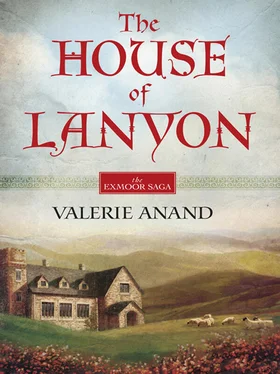“George Lanyon of Allerbrook’s funeral party,” said Reginald contemptuously. “Our steward, Baker, attended it.” He looked around, but the steward had withdrawn and was out of hearing. Reginald laughed. “He said they dropped the coffin and it almost went into the river. But they got it up and it was all right. There was no harm done.”
“George Lanyon’s no loss. Maybe deer know men from women, but George Lanyon never knew gentle from simple,” said Sir Humphrey. His eyes, which were grey and always inclined to be cold, became positively icy at the thought of the departed George. “Had the presumption to argue when his rent went up, as if rents don’t have to go up now and then—it’s the course of nature. Let’s hope the son—what’s his name…?”
“Richard Lanyon, Grandfather.” Walter’s eleven-year-old son, Baldwin, was also in the company.
“That’s it. Richard. Bigheaded peasant who won’t let anyone call him Dickon. We can hope he’s less bloody-minded than George, but I doubt it. There’s something about him. He doesn’t like taking his cap off to me. He’ll very likely be even worse than his father was. Ah, here’s Baker back again. More mulled wine, Baker.”
When he brought the wine, Geoffrey said, “I’ve ordered a fresh basket of firewood to be brought in. The weather’s turning colder. It feels as if winter’s on its way early.”
“That ought to cool the talk of war,” Thomas said. “No fun campaigning in snow and mud. Wonder if it’ll come to fighting?”
“That’s anyone’s guess,” Sir Humphrey said. “What makes me laugh is the way they use roses as their badges! A red rose for the House of Lancaster, a white rose for the House of York! As though they were carrying ladies’ favours at a tournament! Pretty-pretty nonsense.”
“Their ambitions aren’t nonsense, though,” said Reginald. “They’re fighting over the crown.”
CHAPTER THREE
THE BUSINESS OF MARRIAGE
Nicholas and Margaret Weaver’s home in the coastal village of Dunster had a characteristic smell, a mixture of oiliness and mustiness with a hint of the farmyard. It was the smell of sheep fleece, and it pervaded the whole house, even the bedchambers. Which was natural, for wool was their world.
Rents from sheep farmers accounted for much of the wealth of the Luttrell family, who lived in the castle overlooking the village. The spinning of yarn and the weaving of cloth were the main trades of the village, and the monks of Cleeve Abbey, a few miles to the east, close to a village called Washford, were industrious shepherds who brought their fleeces regularly to Dunster and did so much business there that they had a fulling mill at the western end of the village and a house of their own in North Street. The abbots of Cleeve spent nearly as much time in Dunster as they did in their monastery.
The Weaver family, who had taken their surname from their trade generations ago, were as prolific as the Lanyons were not. Nicholas, who had had some schooling and knew many well-travelled merchants, said that he had heard of people in far-off places who lived in communities known as tribes, which had usually grown from an original large family. His own cheerful, noisy, crowded family, he was wont to say, was almost a tribe.
It was a fair summing-up. They all knew how they were related to each other and they all, more or less, lived together, although sheer necessity had obliged them, eventually, to spread first of all into the house next door when the tenancy chanced to fall vacant, and later to rent the house opposite, as well.
By that time Nicholas’s cousin Laurence and his richly fertile wife, Elena, had a family of formidable dimensions and it was their branch of the tribe that moved across the road, where they took to carding and yarn spinning as distinct from the actual weaving. At one time, like many other families, the Weavers had bought yarn from other cottagers, who made their living by spinning. Until it occurred to Laurence that they had hands enough to do both jobs, whereupon he set his side of the family to creating yarn. Only the fulling and dyeing had to be contracted out. Otherwise, the family bought raw fleeces and did the rest themselves.
Under Nicholas’s roof, only Margaret now spun yarn. She had a knack for creating a thin, strong woollen thread which she sold, undyed, on market days, a small but useful addition to the household coffers.
Renting the third house was a wise move from every point of view. The various cousins, uncles and aunts who had been squeezed in with Nicholas and Margaret could now occupy the next-door premises. Meanwhile, as time went on, Laurence and Elena brought their family to ten, plus a daughter-in-law and three grandchildren. As yet, the youngsters were too small to be useful, but they would soon be big enough to learn to spin. They would also take up space. Laurence eased the congestion as best he could by building a workroom on to the back of his house. Nicholas likewise constructed a weaving shed to the rear of his. These additions made little difference, though. The Weavers remained much as they always had been: amiably argumentative—and crowded.
With so many mouths to feed and three rents to be paid, their prosperity had to be carefully nurtured. They grew vegetables and reared poultry in the long back gardens of the three houses and Nicholas now rented a meadow on a hillside at the seaward end of the village, where he kept not only his three ponies but also two cows. He had built a byre-cum-stable there as shelter for the animals and somewhere to store tack and winter fodder. Margaret was good at dairy work as well as spinning thread, and they had cheese and cream for everyone.
It was also a family custom to marry their daughters off early, taking their youthful appetites for food into other people’s households. Sometimes even surplus boys were exported. Nicholas and Margaret had two young sons and one of them, eventually, might have to leave home. “A good rose bush needs regular pruning” was the way Nicholas put it.
And the next one to be pruned, thought their daughter Liza, is going to be me.
From the moment her parents arrived home from George Lanyon’s funeral, she had sensed that something was in the air, though at first it wasn’t clear what the something was. The return of Nicholas and Margaret chanced to coincide with a busy time. New orders for cloth had come in, and there had been a problem at the Cleeve Abbey fulling mill, which the Dunster weavers used as well as the monks, to get their cloth cleaned with water and fuller’s earth before dyeing. A thunderstorm on the moors had sent quantities of peat down the Avill River and polluted the water supply. “It’s always happening. Nature wants us to dye all our cloth dark brown,” Nicholas grumbled. “We’ll have to send it somewhere else till the river clears. Can’t go delaying orders from new customers. That’s bad business.”
But concerned though the family had been with these matters, there had been something else on their minds. Twice Liza had walked into a room to find her parents talking to other family members, and the conversation had stopped short the moment she appeared. And she had noticed her parents glancing at her, pleasantly enough, but thoughtfully, too, as though they were wondering…
Wondering what? Liza could guess the answer to that. Indeed, she had been through all this before and was fairly sure that she recognised the symptoms. They had a marriage in mind for her and were asking themselves whether she would be pleased with it or not.
She had been expecting something like this. After all, she was the eldest daughter. She was twenty-three now and should have been wedded long ago. Three of her younger sisters were married and the little one, Jane, the infant of the family, was single only because she was as yet only seven years old. Liza had stayed unmarried so far because first one thing and then another had interfered with her parents’ plans. They had arranged a very good match for her when she was sixteen, but the young man inconsiderately died of a fever before the wedding day. Another proposal came in quite soon, but the prospective bridegroom, though well-off and good-natured enough, was nearly fifty. Liza objected and neither Nicholas nor Margaret were easy about the matter, either. The argument—put forward by Aunt Cecy, one of the older family members—that she would probably become a wealthy widow before long and could then please herself, failed to convince either Liza or her parents and the negotiations died away.
Читать дальше












